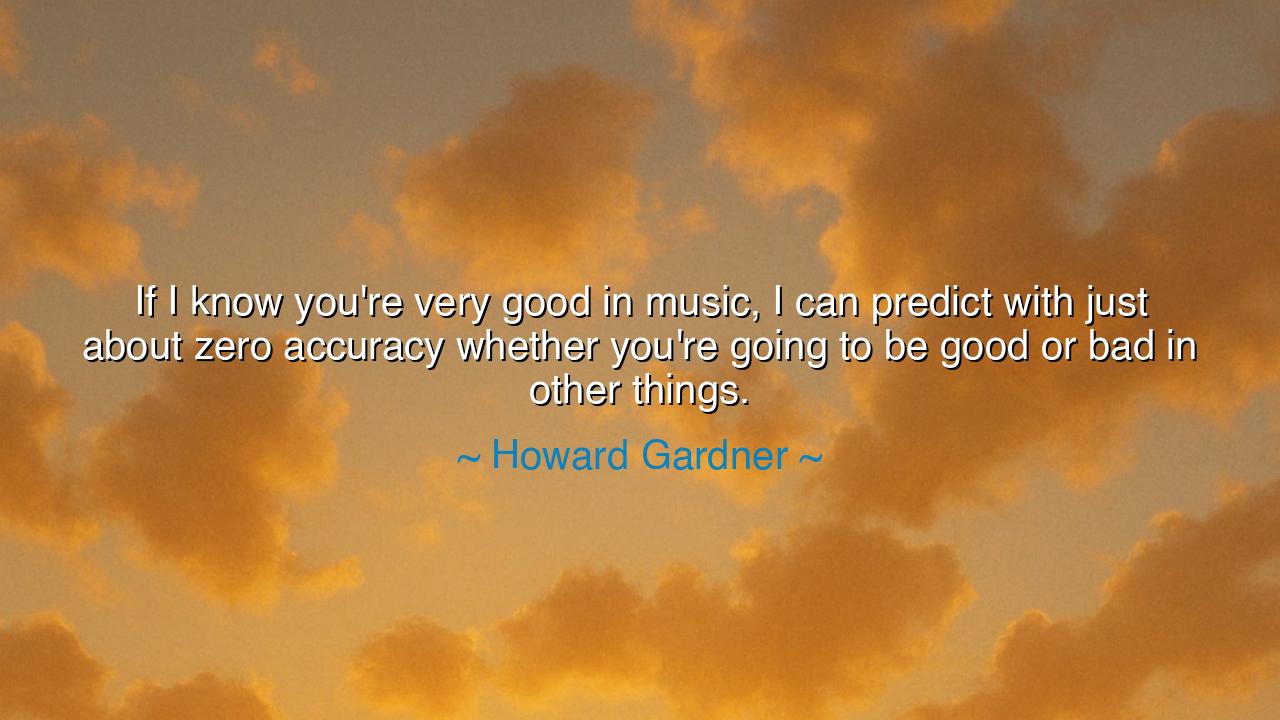
If I know you're very good in music, I can predict with just
If I know you're very good in music, I can predict with just about zero accuracy whether you're going to be good or bad in other things.






Hear the words of Howard Gardner, a seeker of wisdom in the realm of the mind, who declared: “If I know you’re very good in music, I can predict with just about zero accuracy whether you’re going to be good or bad in other things.” At first glance these words may seem almost playful, but within them lies a deep revelation about the nature of human ability. For Gardner, who spoke often of multiple intelligences, reminds us that mastery in one domain is no guarantee of mastery in another. The soul of man is not a single stream, but a river with many branches, each flowing in its own direction.
The ancients too knew this truth. In the academies of Athens, a man might excel in poetry yet falter in mathematics, or shine in philosophy but stumble in battle. To Plato, wisdom itself had many forms, and he cautioned against believing that excellence in one art proved excellence in all. Gardner’s words are an echo of this ancient warning: that greatness in music, however divine, does not promise greatness in governance, in science, or in war. Each talent must be measured and cultivated in its own right.
Consider the tale of Wolfgang Amadeus Mozart, whose brilliance in music burned like a star. He mastered the symphony and the opera, crafting works of eternal beauty. Yet in worldly matters—finance, stability, even personal well-being—he often faltered. His genius in melody did not shield him from poverty or misfortune. His life illustrates Gardner’s truth: excellence in one domain does not guarantee strength in others. Talent is a jewel with many facets, but each facet must be polished by different labors.
And yet, let us not despise the narrow brilliance of any gift. The farmer who knows the soil may not know the sea, yet his wisdom feeds nations. The sailor who knows the tides may not know the plow, yet his labor brings the harvest home. Gardner’s words do not diminish music, but rather exalt the diversity of human ability. They remind us that to judge a person by one skill alone is folly, for the soul is vast, and no single art can contain its fullness.
This truth calls us also to humility. If we excel in one field, let us not grow arrogant, imagining that our mastery grants us authority in all things. The warrior who boasts of his strength may falter in diplomacy; the scholar who shines in books may stumble in love. To be wise is to know the limits of one’s gifts, and to honor the gifts of others. Thus Gardner’s teaching is not merely about talent, but about respect—for ourselves, and for the many paths of greatness that others may walk.
The lesson is plain: life is not a single contest, but a tapestry of many threads. If you are gifted in one, rejoice, but do not assume it makes you master of all. Instead, cultivate humility and curiosity. Seek to learn from those whose strengths are different from yours, and together you will weave something stronger than any one talent alone could achieve. For in the joining of gifts lies the true greatness of mankind.
Practical wisdom follows: honor your skill, but do not let it blind you. If you are skilled in music, let your melodies bless the world, but do not scorn the mathematician or the craftsman. If you are wise in science, share your knowledge, but listen also to the poet and the healer. And if you find yourself weak in some domain, do not despair—for strength in one place is no less precious because of weakness in another. What matters is the harmony of all gifts, working together.
So let it be remembered: “If I know you are very good in music, I can predict with just about zero accuracy whether you are good or bad in other things.” These words are not a dismissal, but a hymn to the diversity of human excellence. Take them to heart, children of tomorrow. Do not measure others by a single scale, nor yourself by one success. Rejoice instead in the many streams of ability, and walk humbly, knowing that every soul carries its own brilliance, waiting to be seen.






AAdministratorAdministrator
Welcome, honored guests. Please leave a comment, we will respond soon